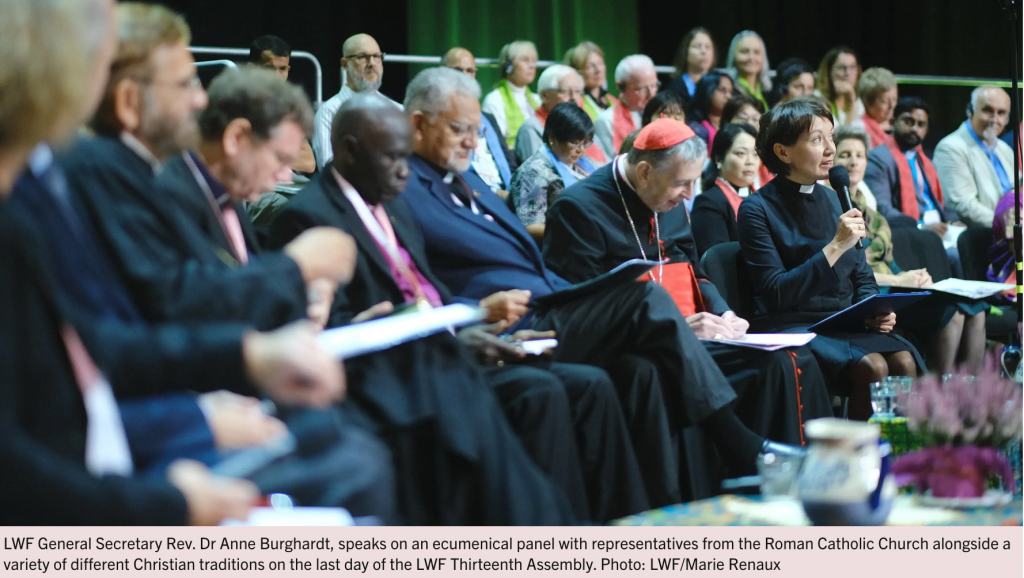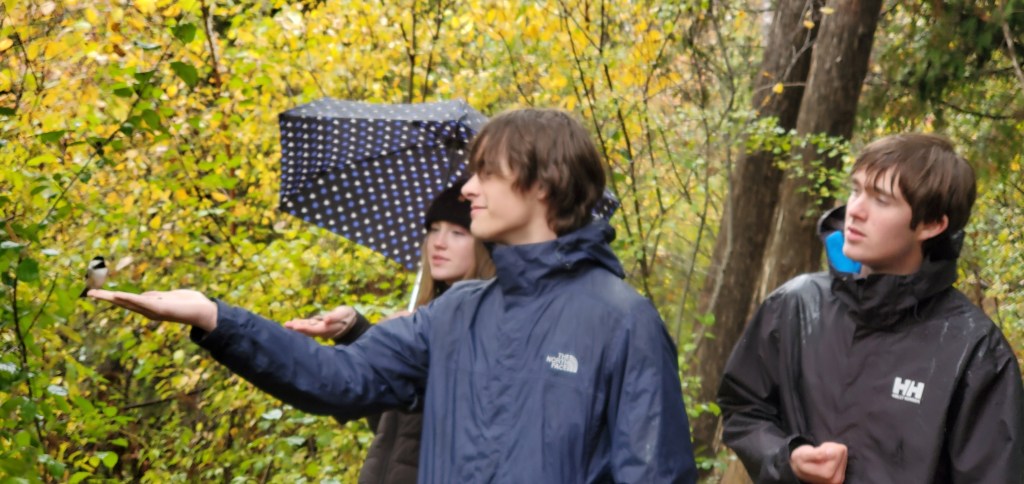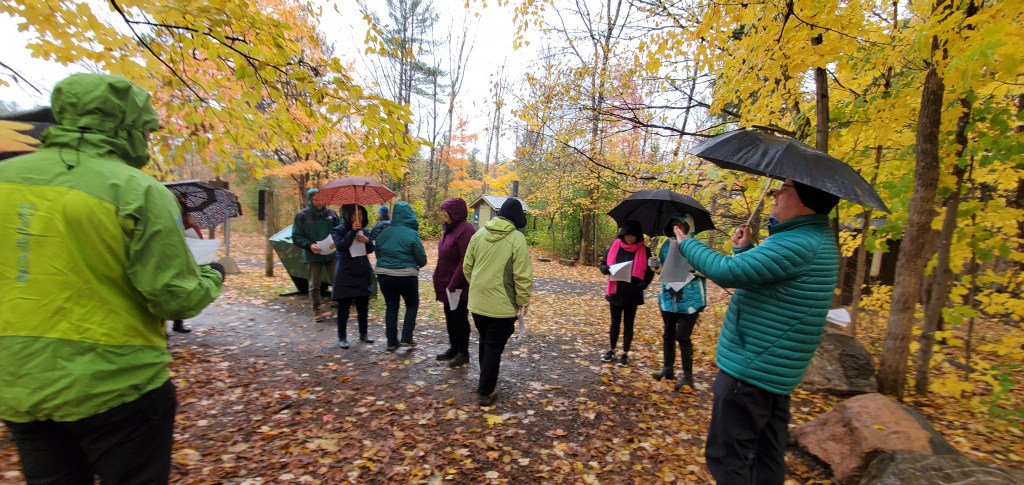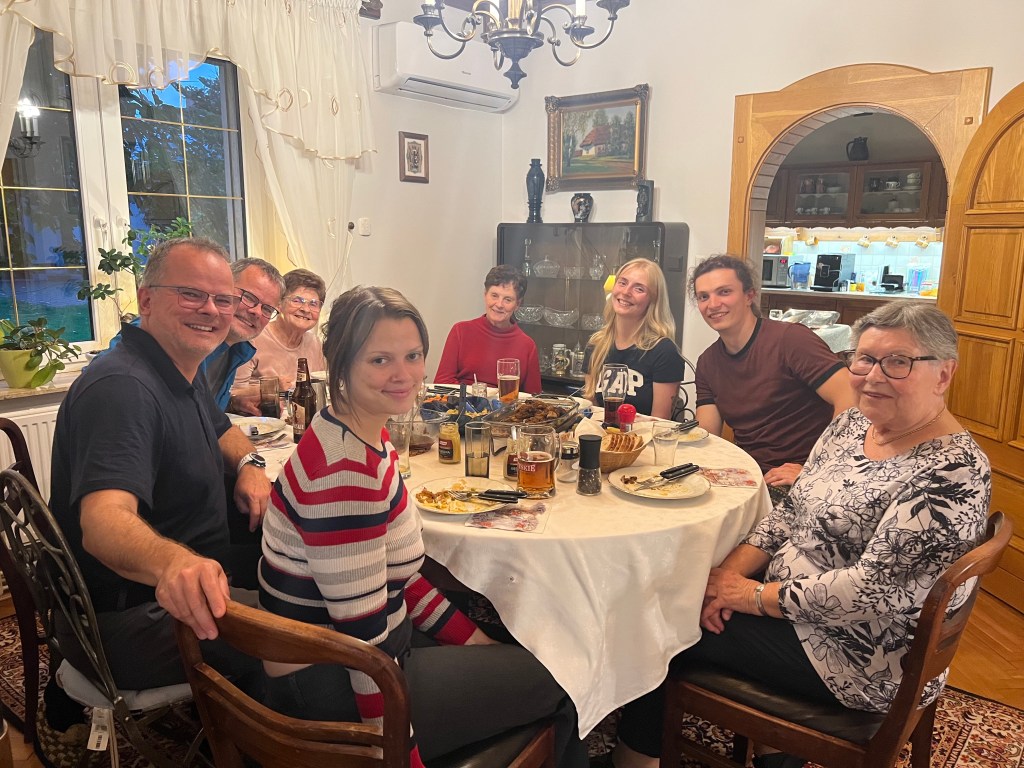A Pentecostal minister, an Orthodox priest, an Anglican reverend, a Methodist pastor, a Mennonite leader, a Roman Catholic Cardinal and a Lutheran walked into a … sounds like the beginning of a bad joke. Or a good one!

No joke. They all walked together into an auditorium in front of hundreds of Lutherans at the 13th Assembly of the Lutheran World Federation last month in Krakow Poland. I was there. And I listened carefully as each leader from their respective church reflected on the meaning of grace – a bedrock theme for Lutherans, especially.
Today is Reformation Sunday. Traditionally this day has been celebrated by Lutherans as a victory day for the triumph of Lutheranism, the history of Martin Luther and the reformers, against the abuses of the Roman Catholic Church in 16th century.
In my youth especially this celebration heightened for me the divisions between Christian denominations, especially vis-à-vis the Roman Catholics. We were the winners. We were right. They were wrong. We had the truth. They did not.
In this culture of divisiveness, often leading to violence, the Protestant Reformation unfortunately fanned the flames of hatred even among Christians, to this day. We only have the historical record in Europe to prove that, as well as local Ottawa Valley stories to expose the depth of the division between Protestants and Catholics.[1]
But we’ve come a long way in over five hundred years, including vis-à-vis Roman Catholics. Are there still differences? Yes, to be sure. But theologically, the doctrine of justification by grace is something most Christians agree on today. The Lutheran Church has matured greatly over the centuries—and I would argue for the better. We are no longer a 16th century church.
All the ecumenical guests at the LWF Assembly last month—the Mennonite, Methodist, Anglican, Orthodox, Roman Catholic, and Pentecostal—spoke passionately about grace, and God’s relationship with us. What did the General Secretary[2] of the Lutheran World Federation—a PhD scholar herself—say?
She began by citing one of Martin Luther’s famous paradoxes. It is found in On the Freedom of a Christian (1520. Luther wrote, “A Christian is utterly free, lord of all, subject to none. A Christian is utterly dutiful, servant of all, subject to all.” This paradox holds the tension, and joins “lord” and “servant” in one person.
In other words, it’s not just one side of it. It’s not just being “utterly free, lord of all, subject to none” – which is the popular understanding of freedom in this land today, is it not? Freedom in Christ, and in a life of faith, involves holding the tension between “utterly free” on the one hand and “servant of all” on the other. The paradox asks us to consider both/and. And not just slip into an easy either/or fix.
How can we live out this paradox, this tension, in a life of faith today? Recently, Lutheran bishops and leaders made public statements on the war in the Middle East.
In her letter, presiding Bishop Elizabeth Eaton of the Evangelical Lutheran Church in America wrote,
“Dear church, As Lutherans, we are accustomed to holding tension between two truths. Thus the ELCA denounces the egregious acts of Hamas, acts that have led to unspeakable loss of life and hope. At the same time the ELCA denounces the indiscriminate retaliation of Israel against the Palestinian people, both Christian and Muslim.”[3]
A few days ago, our Canadian Lutheran bishops also issued a statement on the Israel-Hamas war. Again, listen to the language of both/and: “We are concerned about the rise in antisemitic and anti-Islamic words and actions in our communities and across the world. We pray that all people of faith may embody peace rather than incite hate.
They continue, “Please join us in prayer and concern for the region. For those who mourn their dead on both sides of the conflict. For the hostages and their families, afraid for their lives. For those who have been maimed and injured. For those who have lost their homes. For those who have not been able to move to safety. For the opening of a humanitarian corridor into Gaza. For a peaceful solution to this war. That the war may not escalate into neighbouring countries.”[4]
In Matthew’s Gospel, Jesus says, “I have come to call not the righteous but sinners.”[5] St Paul later taught that “Everyone has sinned.”[6] No one is 100% right in any dispute. And no one is 100% wrong in any dispute. The way forward is learning to hold the tension inside of us, in the world outside of us. And finding a middle ground. Both/And.
Another theme emphasized throughout the LWF Assembly in Poland last month was the Cross of Christ—a central image in Luther’s theology. The cross has two beams, holds the middle between two directions.
Being human and living by faith is neither perfectly consistent—something many of us sitting here likely want—nor is living by faith total chaos—a stance describing much of post-modernism and even atheism.[7] To be a Christian today is to hold the contradictions with God, with Jesus, who held the tension on the cross and thereby showed us the way to new life.
The cross is holding the middle. The cross holds the tension. The world, reality, is neither perfectly consistent nor totally chaotic. We can therefore forgive reality in the world, in humanity, for being what it is. And work for what is right and loving.
There is a cost for holding the contradictions within yourself, to be sure. Things are not always, easily, nor quickly resolved. But the gift, the grace is that nothing is lost. No one is left behind. Nothing is wasted. You belong. They all belong. It all belongs, in the arms of God’s mercy.
In this short Gospel text for Reformation, Jesus says, “continue in my word”. [8] Other translations—the New King James, among others—have it: “abide in my word”. I like that, too.
“Word” and “Truth”. What are we to make of these loaded statements by Jesus? Elsewhere in John’s Gospel, Jesus says, “I am the truth.”[9] Then, in the first chapter of John’s Gospel—one we will hear in full at Christmas: “The Word became flesh and lived among us … full of grace and truth.”[10] Therefore, as Martin Luther himself emphasized, the “Word” is Jesus. And he is also the “Truth”. Now, read the Gospel for today again substituting “Jesus” wherever the words “truth” and “word” appear.
It’s good to compare translations of the bible. I referred to the New King James Version earlier in comparison to the New Revised Standard Version. Sometimes inspiring insights emerge when you do this. In a recent Indigenous translation of the New Testament, verse 35 is truly illuminating for me: “A slave is not a member of the family and will not always live with the family. But a son of the family always has a home.”[11]
Even when you leave, for whatever reason. Even, on many levels, when life takes you away from home. Even when the journey of faith means going away, far away. You belong.
In Christ, you always have a home. There is always a place for you at the table. No matter your denomination, your religious background, or lack thereof, no matter your starting point—you can always come back and find your home, in Christ Jesus.
[1] In Eganville, Ontario, most Protestants lived on one side of the Bonnechere River and Catholics on the other side. Curiously, and tragically, both Grace Lutheran Church and St James Catholic Church buildings burned down in the 1990s.
[2] The Rev. Dr. Anne Burghardt
[3] Bishop Eaton issues statement on Israel-Hamas war , emphasis mine.
[4] ELCIC bishops issue statement on Israel-Hamas war , emphases mine.
[5] Matthew 9:13
[6] Romans 5:12
[7] Richard Rohr, Things Hidden: Scripture as Spirituality (Cincinnati Ohio: St Anthony Messenger Press, 2008), p.204.
[8] John 8:31-36, NRSV
[9] John 14:6
[10] John 1:14
[11] John 8:35, First Nations Version: An Indigenous Translation of the New Testament (Illinois: InterVarsity Press, 2021), p.183





